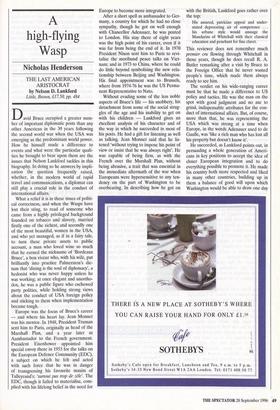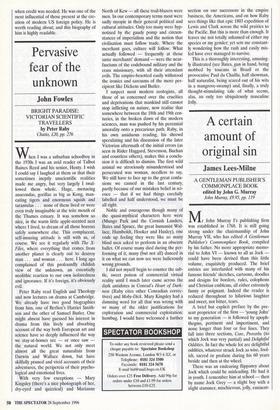A high-flying Wasp
Nicholas Henderson THE LAST AMERICAN ARISTOCRAT by Nelson D. Lankford Little, Brown, £17.50, pp. 484 David Bruce occupied a greater num- ber of important diplomatic posts than any other American in the 30 years following the second world war when the USA was emerging as the predominant world power. How he himself made a difference to events and what were the particular quali- ties he brought to bear upon them are the issues that Nelson Lankford tackles in this biography. In doing so he answers by impli- cation the question frequently raised, whether, in the modern world of rapid travel and communications, a diplomat can still play a crucial role in the conduct of international affairs.
What a relief it is in these times of politi- cal correctness, and when, the Wasps have lost their sting, to read of someone who came from a highly privileged background founded on tobacco and slavery, married firstly one of the richest, and secondly one of the most beautiful, women in the USA, and who yet managed, as if in a fairy tale, to turn these private assets to public account, a man who loved wine so much that he earned the nickname of 'Bordeaux Bruce', a bon viveur who, with his wife, put brilliantly into practice Palmerston's dic- tum that 'dining is the soul of diplomacy', a hedonist who was never happy unless he was working; at once elegant and unortho- dox, he was a public figure who eschewed party politics, while holding strong views about the conduct of USA foreign policy and sticking to them when implementation became tough.
Europe was the focus of Bruce's career — and where his heart lay. Jean Monnet was his mentor. In 1948, President Truman sent him to Paris, originally as head of the Marshall Plan, and a year later as Aambassador to the French government. President Eisenhower appointed him special envoy there in 1953 for the talks on the European Defence Community (EDC), a subject on which he felt and acted with such force that he was in danger of transgressing his favourite maxim of Talleyrand's: ',carton( pas trop de zele'. The EDC, though it failed to materialise, com- plied with his lifelong belief in the need for
Europe to become more integrated.
After a short spell as ambassador to Ger- many, a country for which he had no close sympathy, though he got on well enough with Chancellor Adenauer, he was posted to London. His stay there of eight years was the high point of his career, even if it was far from being the end of it. In 1970 President Nixon sent him to Paris to revi- talise the moribund peace talks on Viet- nam; and in 1973 to China, where he could do little beyond symbolising the new rela- tionship between Beijing and Washington. His final appointment was to Brussels, where from 1974-76 he was the US Perma- nent Representative to Nato.
Without evading some of the less noble aspects of Bruce's life — his snobbery, his detachment from some of the social strug- gles of the age and his inability to get on with his children — Lankford gives an excellent analysis of his character and of the way in which he succeeded in most of his posts. He had a gift for listening as well as talking. Jean Monnet said that he lis- tened 'without trying to impose his point of view or insist that he was always right'. He was capable of being firm, as with the French over the Marshall Plan, without being abrasive, a trait that was essential in the immediate aftermath of the war when Europeans were hypersensitive to any ten- dency on the part of Washington to be overbearing. In describing how he got on with the British, Lankford goes rather over the top: His assured, patrician appeal and under- stated deprecating air of competence ... his urbane style would assuage the Mandarins of Whitehall with their classical education and penchant for fine claret.
This reviewer does not remember much premier cm flowing through Whitehall in those years, though he does recall R. A. Butler remarking after a visit by Bruce to the Foreign Office that he never wasted people's time, which made them always ready to see him.
The verdict on his wide-ranging career must be that he made a difference to US policy and tactics. He was the man on the spot with good judgment and no axe to grind, indispensable attributes for the con- duct of international affairs. But, of course, more than that, he was representing the USA which was strong at a time when Europe, in the words Adenauer used to de Gaulle, was 'like a rich man who has lost all his property but doesn't know it'.
He succeeded, as Lankford points out, in persuading a whole generation of Ameri- cans in key positions to accept the idea of closer European integration and to do everything possible to promote it. He made his country both more respected and liked in many other countries, building up in them a balance of good will upon which Washington would be able to draw one day
when credit was needed. He was one of the most influential of those present at the cre- ation of modem US foreign policy. He is worth reading about; and this biography of him is highly readable.



















































































 Previous page
Previous page